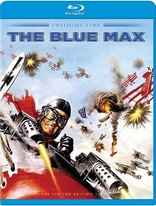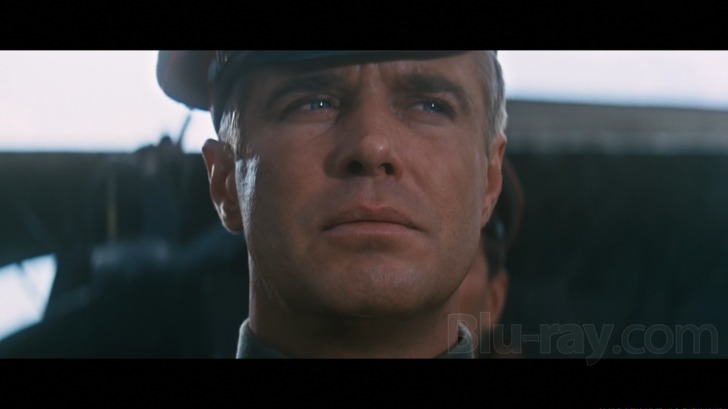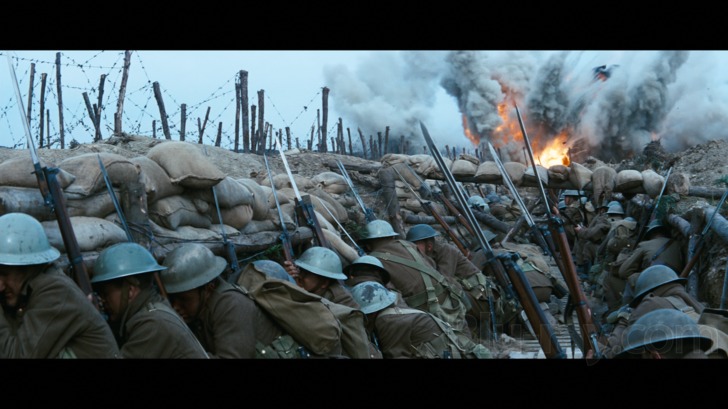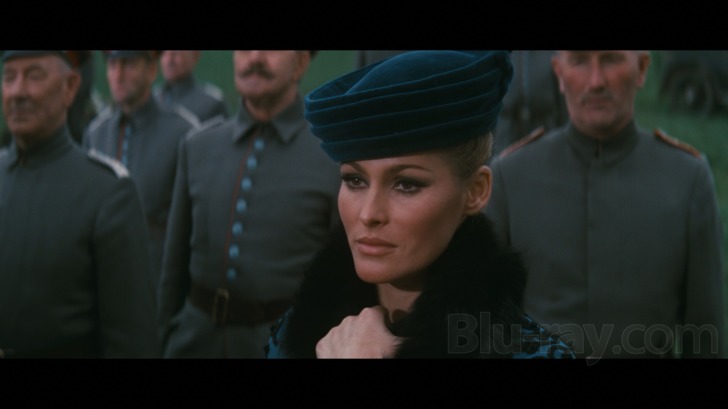The Blue Max Blu-ray Movie
HomeThe Blue Max Blu-ray Movie 
Limited Edition to 3000 - SOLD OUTTwilight Time | 1966 | 156 min | Not rated | Feb 11, 2014

Movie rating
7.2 | / 10 |
Blu-ray rating
| Users | 0.0 | |
| Reviewer | 4.0 | |
| Overall | 4.0 |
Overview
The Blue Max (1966)
The tactics of a German fighter pilot offend his aristocratic comrades but win him his country's most honored medal, the Blue Max. A General finds him useful as a hero, though his wife finds him useful in other ways.
Starring: George Peppard, James Mason (I), Ursula Andress, Jeremy Kemp, Karl Michael VoglerDirector: John Guillermin
| War | Uncertain |
| Drama | Uncertain |
| Action | Uncertain |
Specifications
Video
Video codec: MPEG-4 AVC
Video resolution: 1080p
Aspect ratio: 2.36:1
Original aspect ratio: 2.35:1
Audio
English: DTS-HD Master Audio 5.1 (48kHz, 24-bit)
Music: DTS-HD Master Audio 2.0 (48kHz, 24-bit)
Subtitles
English SDH
Discs
50GB Blu-ray Disc
Single disc (1 BD)
Playback
Region free
Review
Rating summary
| Movie | 3.5 | |
| Video | 5.0 | |
| Audio | 4.5 | |
| Extras | 3.5 | |
| Overall | 4.0 |
The Blue Max Blu-ray Movie Review
Shouldn't that be Blu-Max?
Reviewed by Jeffrey Kauffman February 24, 2014World War I has become synonymous with so-called trench warfare, a desperate, incremental form of battle where soldiers hunkered down in pits and prayed that incoming bullets or mortar fire, not to mention the noxious gas that became such a notorious part of that era, wouldn’t find them. Isn’t it somewhat ironic, then, that World War I also saw the birth of “modern” air warfare, at least on a global scale? What are typically thought of as the first “real” airplanes, a la the Wright Brothers, had been in existence barely a decade when World War I broke out on July 28, 1914. (Relatively minor skirmishes like the 1911 conflict between Italy and Turkey had also seen the early use of airplanes.) Mankind’s irrational ability to find ever “better” technologies to decimate enemies didn’t take long to realize that the airplane provided incredible strategic advantages, and planes became the “go to” method that tacticians utilized at least for reconnaissance. That in turn started to lead to actual air battles, where opposing forces would shoot it out to determine who would have the (literal) upper hand in being able to ferret out enemy positions. It’s against this background that 1966’s war epic The Blue Max plays out. The film is interesting in that it posits a German “hero” and looks at the War from a decidedly Teutonic point of view, even though it was a British- American production. As odd as it may sound (and bear with this admitttedly outre comparison for a moment), The Blue Max shares some rather peculiar similarities with a much less renowned 1966 film, the Harlan Ellison penned stinker The Oscar. Both of these films offer a not totally likable (and some might even say somewhat despicable), social climbing leading character on an almost obsessive quest to obtain a trophy, leaving a trail of wounded folks (either literally, as in the case of The Blue Max, or figuratively, as in the case of The Oscar) in their wakes. Both films featured all star supporting casts, though both offered their lead roles to somewhat stiff actors (Stephen Boyd in The Oscar, George Peppard in The Blue Max) who, despite occasional successes, never really rose to the front ranks of their profession. If The Oscar posited the sort of psychological (and decidedly earthbound) warfare that seems to be an intrinsic part of show business, The Blue Max took its aerial proclivities to some quite remarkable heights, with some of the most stunning sky-bound cinematography ever achieved in film.

The Blue Max gives us a brief but riveting up close and personal view of trench warfare, as German grunt Bruno Stachel (George Peppard) makes his way through incoming fire to a temporary respite in a dirty pit which is filled with rotting corpses. A distant buzz piques his curiosity and he glances skyward to see a biplane passing overhead. The film quickly segues to Stachel joining an elite German aerial unit, though his acclimation to his new role is perhaps appropriately not without some turbulence. The German Air Corps is made up largely of aristocrats, and Stachel has a decidedly proletarian background. Though Stachel’s Commander, Hauptmann Otto Heidemann (Karl Michael Vogler) insists Stachel’s anxiety about his background is his own business, it’s obvious that some of Stachel’s new comrades find him a rather odd, and perhaps even unworthy, addition to their ranks.
Ironically, Stachel’s less than storied background becomes fodder for Germany’s war machine propaganda efforts when General Count von Klugermann (James Mason) is introduced to Stachel and realizes that a fighter without the perks of having been born with a silver spoon in his mouth might actually excite the masses more than the more traditional prosperous and well connected hero. The film treats this rather cynical turn of events with a kind of calm precision, making it clear that the fighter pilots were the “rock stars” of their day, and that Germany was not immune to publicizing their exploits in as positive a way as possible.
Stachel’s reputation is still somewhat problematic, at least within his own squadron. His single minded efforts to earn a Blue Max, an award of merit German grants pilots who have successfully downed twenty enemy aircraft, makes him even more of an outsider, especially when one of his “kills” is questioned and another is (unfairly) seen as an act of uncommon brutality (a rather ironic situation, considering the context). That all changes at least for a moment when Stachel manages to save none other than the Red Baron, Manfred von Richtofen (Carl Schell).
But Stachel’s egotistic and self serving sides get in the way yet again when a tragic death of his cohort (and nephew of General von Klugermann) gives Stachel the opportunity to claim two of the nephew’s kills, thus putting him over the required total to receive a Blue Max. More drama ensues which includes a sidebar featuring a spectacularly voluptuous Ursula Andress as the serially unfaithful wife of the General, as well as what would seem to be Stachel’s triumph to achieve his goal. Like any good anti-hero, though, there’s a comeuppance in store and The Blue Max closes in a somewhat bittersweet, though probably morally superior, fashion.
Director John Guillermin was evidently one of the more problematic tyrants in the annals of film, though his reportedly martinet demeanor may have served him well on a project with the gargantuan scope of The Blue Max. The film’s screenplay is an incredibly talky affair, interrupted by some amazingly brilliant aerial photography (done by Anthony Squire). It’s to Guillermin’s credit that the film, while somewhat lethargic in that bloated mid-sixties manner, manages to still attain a modicum of dramatic momentum, especially once Stachel’s self destructive tendencies come to the fore.
The film is perhaps not very well served by Peppard, whose surfer boy good looks may be appropriately Teutonic, but whose American patois grates rather inconsistently with a rather wide variety of European accents that most of the supporting cast offers. Peppard had a weird, almost aloof sort of charisma (something he in fact shared with The Oscar’s Boyd), something that might have worked toward the benefit of the film with regard to Stachel’s dichotomous persona. But the real interest here often seems to be the political machinations surrounding Stachel rather than Stachel himself.
Still, The Blue Max is often viscerally exciting fare. The aerial scenes have never been topped, and they afford the film an almost ironic majesty, a bird’s eye view of carnage that somehow casts an almost poetic luster on the grim task of warfare. Supporting performances are excellent, and the story has a sort of preordained march toward an unavoidable fate that gives it the gravitas of great tragedy. If Peppard tends to be something of a statue rather than a human at the core of the film, there’s plenty going on around him to maintain interest.
The Blue Max Blu-ray Movie, Video Quality 

The Blue Max is presented on Blu-ray with an AVC encoded 1080p transfer in 2.36:1. This Fox CinemaScope picture looks ravishing on Blu-ray, and those who only have known the film through its broadcast iterations on previous (problematic) home video releases may well be stunned at the difference here. Colors are gorgeously vivid and accurate looking (take a gander at Peppard's eyes in several screenshots—if he couldn't give Paul Newman a run for his baby blue money, I don't know who could). (Especially notable in the color reproduction are the lush reds; they have neither the rust color that would indicate a brown tint nor a purplish edge which would indicate a push toward blue.) The elements were either pristine or lovingly restored, with no diminution of natural grain or artificial sharpening. There is heavier grain and attendant softness in some process shots, and some of the rear projection is now more obvious than it was before, but that's simply because this transfer is so luminously clear. Contrast and black levels are consistently strong throughout the film and this certainly ranks as one of the finest looking high definition masters Fox has licensed.
The Blue Max Blu-ray Movie, Audio Quality 

The Blue Max features a lossless DTS-HD Master Audio 5.1 track which nicely repurposes the original four track mag soundtrack. If things aren't quite as bombastic as contemporary listeners might be used to, they often come close, with fantastic LFE recreating the thunderous explosions of early 20th century warfare. The buzz and rattle of early flight also fills the surrounds in several key sequences. Dialogue is always cleanly and clearly presented. But it's Jerry Goldsmith's majestic score which really benefits the most from this lossless audio. From the first descending fourth in the strings (which some may feel presages Goldsmith's appropriation of Alexander Courage's Star Trek theme in Goldsmith's own Star Trek work) through the gorgeously burnished brass work, the score (as sadly truncated as it is in the film) has never sounded this magnificent. Fidelity is excellent and dynamic range is extremely wide.
The Blue Max Blu-ray Movie, Special Features and Extras 

- Isolated Score Track offers Jerry Goldsmith's complete score via DTS-HD Master Audio 2.0.
- Audio Commentary with Jon Burlingame, Julie Kirgo and Nick Redman is devoted mostly to Goldsmith's music and offers alternate versions of three cues. This is a great commentary for film score lovers, and there's a wealth of information about Goldsmith and his trials on this film. One thing I thought would get mentioned that never did (unless I somehow missed it), especially considering Burlingame's emphasis on Goldsmith using so many classical forms in this score, is what I have always felt is a very brief but telling quoting of Prokofiev's Fifth Symphony in one of the opening motives of Goldsmith's main theme. Since that symphony was written as a "critique" of war (albeit World War II), I've never felt this was a mere coincidence (although admittedly it might have been a subliminal "borrowing" on the part of Goldsmith). You can hear it at around ten seconds into the first track on either of the CD releases of the score (co-produced by Redman), or between approximately 1:48 and 1:55 in the opening of the film.
- Theatrical Trailer (480p; 3:09)
The Blue Max Blu-ray Movie, Overall Score and Recommendation 

The Blue Max is a bit too overheated for its own good, and it probably could have been trimmed of a few minutes and come out no worse for the wear. Peppard is oddly stiff and distant in the lead role, and he sounds terminally anachronistic as a German, of all things, but the story here is quite interesting and the cinematography and score are superb. This transfer is one of the best looking Fox CinemaScope Blu-rays we've had, and fans should be very well pleased with this release. Highly recommended.
Similar titles
Similar titles you might also like

The Bridge at Remagen
1969

Aces High
1976

A Bridge Too Far
1977

Hamburger Hill
1987

Twelve O'Clock High
1949

The Green Berets
1968

5 Days of War
2011

Jarhead
2005

All Quiet on the Western Front 4K
Im Westen nichts Neues
2022

The Young Lions
Limited Edition to 3000 - SOLD OUT
1958

9th Company
9 rota | Collector's Edition
2005

They Were Expendable
Warner Archive Collection
1945

Sands of Iwo Jima
4K Restoration
1949

Gallipoli
1981

Cross of Iron
1977

Journey's End
2017

Platoon 4K
Collector's Edition
1986

Greyhound
2020

Generation Kill
2008

Stalingrad
1993